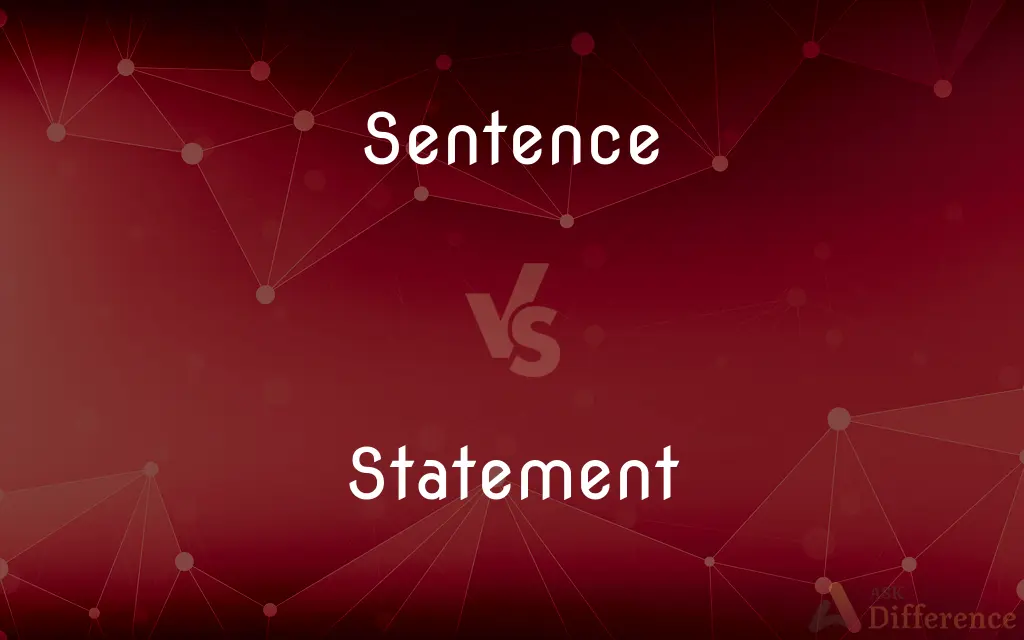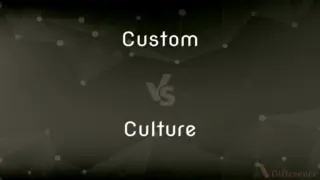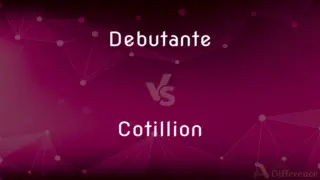Sentence vs. Statement — What's the Difference?
By Tayyaba Rehman & Maham Liaqat — Updated on April 25, 2024
A sentence is a grammatical unit with a subject and predicate, expressing a complete thought; a statement is any declarative sentence that conveys information.

Difference Between Sentence and Statement
Table of Contents
ADVERTISEMENT
Key Differences
A sentence is a structured combination of words following grammatical rules, typically containing a subject and a verb to form a complete thought. On the other hand, a statement specifically refers to a type of sentence that declares something, often used to convey facts or opinions.
In terms of function, every sentence aims to express an idea, whether it's a question, command, or exclamation. Whereas a statement's primary purpose is to provide information or assert facts, making it inherently declarative.
Sentences can be categorized into various types such as declarative, interrogative, imperative, and exclamatory based on their purpose and punctuation. Statements are strictly declarative; they relay information or express an opinion without asking a question or giving a command.
From a syntactic perspective, a sentence must have at least a subject and a verb to be considered complete. On the other hand, a statement, while generally following the same syntactic rules, is evaluated more for its truth value than its grammatical completeness.
In everyday usage, sentences form the basic building blocks of communication in both spoken and written forms. In contrast, statements are often used in more specific contexts, such as in legal, academic, or informational texts, where clarity and factuality are paramount.
ADVERTISEMENT
Comparison Chart
Definition
A grammatical unit that is complete in itself.
A declarative sentence that conveys information.
Types
Declarative, interrogative, imperative, exclamatory.
Primarily declarative.
Purpose
To express statements, questions, commands, or exclamations.
To provide information or assert something as true.
Requirement
Must have a subject and a verb.
Must state information or an opinion, often fact-based.
Usage Context
General communication in spoken and written form.
Often used in formal or factual contexts like legal writing.
Compare with Definitions
Sentence
A linguistic expression capable of conveying a complete thought.
It's raining.
Statement
A declarative sentence that provides information or expresses an opinion.
The Earth revolves around the Sun.
Sentence
A verbal structure that may include clauses and phrases positioned according to rules of syntax.
Although it was raining, we went for a walk.
Statement
A form of expression in writing or speech that states something conclusively or authoritatively.
Smoking is harmful to health.
Sentence
A set of words that is complete in itself, typically containing a subject and predicate.
The quick brown fox jumps over the lazy dog.
Statement
A sentence aimed at asserting a fact or belief.
Democracy is the best form of government.
Sentence
An expression in spoken or written form that conveys a statement, question, exclamation, or command.
Did you go to the market today?
Statement
An utterance that declares something to be true, used especially in persuasive or informative contexts.
Water boils at 100 degrees Celsius.
Sentence
A grammatical unit that starts with a capital letter and ends with a full stop, question mark, or exclamation mark.
Stop!
Statement
A communication intended to convey factual information, often supported by evidence.
He was at the office yesterday.
Sentence
A grammatical unit that is syntactically independent and has a subject that is expressed or, as in imperative sentences, understood and a predicate that contains at least one finite verb.
Statement
The act of stating or declaring
The attorney's statement took an hour.
Sentence
The penalty imposed by a law court or other authority upon someone found guilty of a crime or other offense.
Statement
Something stated; a declaration
The witness made many false statements.
Sentence
(Archaic) A maxim.
Statement
A formal oral or written declaration, especially with regard to facts or claims
In a statement, the firm denied any wrongdoing.
Sentence
(Obsolete) An opinion, especially one given formally after deliberation.
Statement
An abstract of a commercial or financial account showing an amount due; a bill.
Sentence
To impose a sentence on (a criminal defendant found guilty, for example).
Statement
A monthly report sent to a debtor or bank depositor.
Sentence
(dated) The decision or judgement of a jury or court; a verdict.
The court returned a sentence of guilt in the first charge, but innocence in the second.
Statement
(Computers) An elementary instruction in a programming language.
Sentence
The judicial order for a punishment to be imposed on a person convicted of a crime.
The judge declared a sentence of death by hanging for the infamous child rapist.
Statement
An overall impression or mood intended to be communicated, especially by means other than words
Glass, exposed beams, and antiques created a strong decorative statement.
Sentence
A punishment imposed on a person convicted of a crime.
Statement
Having a striking appearance, often because of large size, unusual design, or extensive ornamentation
A statement necklace.
Statement furniture.
Sentence
(obsolete) A saying, especially from a great person; a maxim, an apophthegm.
Statement
A declaration or remark.
Make a statement
Publish a statement
Utter a statement
Sentence
(grammar) A grammatically complete series of words consisting of a subject and predicate, even if one or the other is implied, and typically beginning with a capital letter and ending with a full stop or other punctuation.
The children were made to construct sentences consisting of nouns and verbs from the list on the chalkboard.
Statement
A presentation of opinion or position.
Sentence
(logic) A formula with no free variables.
Statement
(finance) A document that summarizes financial activity.
A bank statement
Sentence
(computing theory) Any of the set of strings that can be generated by a given formal grammar.
Statement
(computing) An instruction in a computer program, especially one that returns no value, as opposed to a function call.
Sentence
(obsolete) Sense; meaning; significance.
Statement
(transitive) To provide an official document of a proposition, especially in the UK a Statement of Special Educational Needs.
Sentence
(obsolete) One's opinion; manner of thinking.
Statement
The act of stating, reciting, or presenting, orally or on paper; as, to interrupt a speaker in the statement of his case.
Sentence
A pronounced opinion or judgment on a given question.
Statement
That which is stated; a formal embodiment in language of facts or opinions; a narrative; a recital.
Sentence
To declare a sentence on a convicted person; to condemn to punishment.
The judge sentenced the embezzler to ten years in prison, along with a hefty fine.
Statement
A message that is stated or declared; a communication (oral or written) setting forth particulars or facts etc;
According to his statement he was in London on that day
Sentence
To decree, announce, or pass as a sentence.
Statement
A fact or assertion offered as evidence that something is true;
It was a strong argument that his hypothesis was true
Sentence
(obsolete) To utter sententiously.
Statement
(music) the presentation of a musical theme;
The initial statement of the sonata
Sentence
Sense; meaning; significance.
Tales of best sentence and most solace.
The discourse itself, voluble enough, and full of sentence.
Statement
A nonverbal message;
A Cadillac makes a statement about who you are
His tantrums are a statement of his need for attention
Sentence
An opinion; a decision; a determination; a judgment, especially one of an unfavorable nature.
My sentence is for open war.
That by them [Luther's works] we may pass sentence upon his doctrines.
Statement
The act of affirming or asserting or stating something
Sentence
A philosophical or theological opinion; a dogma; as, Summary of the Sentences; Book of the Sentences.
Statement
(computer science) a line of code written as part of a computer program
Sentence
In civil and admiralty law, the judgment of a court pronounced in a cause; in criminal and ecclesiastical courts, a judgment passed on a criminal by a court or judge; condemnation pronounced by a judicial tribunal; doom. In common law, the term is exclusively used to denote the judgment in criminal cases.
Received the sentence of the law.
Statement
A document showing credits and debits
Sentence
A short saying, usually containing moral instruction; a maxim; an axiom; a saw.
Sentence
A combination of words which is complete as expressing a thought, and in writing is marked at the close by a period, or full point. See Proposition, 4.
He fills, he bounds, connects, and equals all.
A king . . . understanding dark sentences.
Sentence
To pass or pronounce judgment upon; to doom; to condemn to punishment; to prescribe the punishment of.
Nature herself is sentenced in your doom.
Sentence
To decree or announce as a sentence.
Sentence
To utter sententiously.
Sentence
A string of words satisfying the grammatical rules of a language;
He always spoke in grammatical sentences
Sentence
(criminal law) a final judgment of guilty in a criminal case and the punishment that is imposed;
The conviction came as no surprise
Sentence
The period of time a prisoner is imprisoned;
He served a prison term of 15 months
His sentence was 5 to 10 years
He is doing time in the county jail
Sentence
Pronounce a sentence on (somebody) in a court of law;
He was condemned to ten years in prison
Common Curiosities
Can all sentences be statements?
No, only declarative sentences that provide information or assert facts are considered statements.
What distinguishes a sentence from a statement?
While a sentence is a broader concept that includes various types (questions, commands, etc.), a statement is specifically a declarative sentence aimed at providing information or asserting facts.
Are all statements sentences?
Yes, all statements are sentences, but they are specifically declarative in nature.
Can a single word be a sentence?
Yes, a single word can be a sentence if it conveys a complete thought, like "Run!" or "Stop."
Why are statements important in communication?
Statements provide clarity and assert information, making them crucial for factual and authoritative communication.
How does the structure of a statement differ from other types of sentences?
Statements typically follow a subject-verb-object structure, focusing on clarity and directness.
What role do statements play in argumentative writing?
Statements form the backbone of argumentative writing, as they present facts and assertions that support an argument.
What is a sentence?
A sentence is a set of words that forms a complete thought, typically containing a subject and predicate, and ends with a punctuation mark.
How do punctuation marks affect sentences and statements?
Punctuation marks define the type of sentence; for example, statements end with a period, whereas questions end with a question mark.
What is a statement?
A statement is a type of declarative sentence used to provide information or assert something as a fact.
Can a single word be a statement?
Typically, no, as statements generally require a subject and predicate to convey information effectively.
What are examples of sentences that are not statements?
"Could you pass the salt?" and "Please close the door!" are sentences but not statements, as they are requests, not declarative sentences.
Can a question be turned into a statement?
Yes, a question like "Do you know him?" can be turned into a statement: "You know him."
How do writers use sentences and statements differently in literature?
In literature, sentences of all types are used to build narrative, dialogue, and expression, whereas statements are specifically used to assert facts or opinions within the narrative.
In what contexts are statements predominantly used?
Statements are widely used in legal, academic, and scientific contexts where information needs to be clear and supported by facts.
Share Your Discovery

Previous Comparison
Custom vs. Culture
Next Comparison
Debutante vs. CotillionAuthor Spotlight
Written by
Tayyaba RehmanTayyaba Rehman is a distinguished writer, currently serving as a primary contributor to askdifference.com. As a researcher in semantics and etymology, Tayyaba's passion for the complexity of languages and their distinctions has found a perfect home on the platform. Tayyaba delves into the intricacies of language, distinguishing between commonly confused words and phrases, thereby providing clarity for readers worldwide.
Co-written by
Maham Liaqat













































